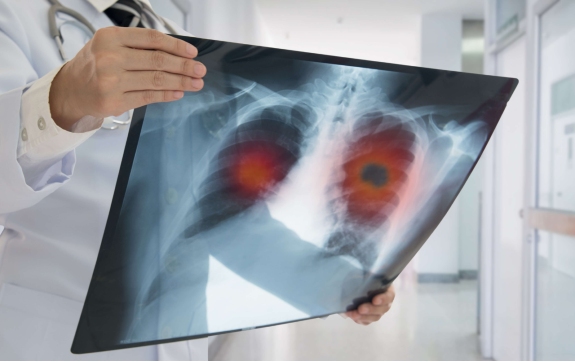New Lung Cancer Trial Could Benefit Mesothelioma Patients
Research & Clinical TrialsWritten by Sean Marchese, MS, RN | Edited By Walter Pacheco

Pharmaceutical giant Merck has teamed up with Novocure to test its cornerstone immunotherapy, pembrolizumab (Keytruda), alongside Tumor Treating Fields.
The new phase II clinical research trial is focusing on non-small cell lung cancer and will enroll approximately 66 patients across the U.S.
Keytruda, Merck’s anti-PD-1 therapy, works as a checkpoint inhibitor and allows the immune system to identify and attack cancer cells hiding within the PD-1 pathway. The FDA approved Keytruda for mesothelioma as the first immunotherapy treatment for the disease in 2020.
Novocure, a global oncology company, has been developing Tumor Treating Fields since 2000. In 2019, the FDA approved the treatment for malignant pleural mesothelioma.
TTFields limits cancer growth by delivering alternating electrical fields through insulated adhesive pads that attach to the skin.
The phase II pilot study will test the combination as a first-line treatment of intrathoracic advanced or metastatic PD-L1 positive non-small cell lung cancer.
TTF, Keytruda Combination Has Potential for Improved Immune Response
The primary endpoint of the study will be the objective response rate. Progression-free survival at six months, one-year survival rate, duration of response, disease control at 18 weeks and overall safety encompass the study’s secondary endpoints.
“Multiple preclinical studies suggest that the use of Tumor Treating Fields, together with anti-PD-1 therapy, can potentially augment the immune response, resulting in improved tumor control,” said William Doyle, Novocure’s executive chairman.
Non-small lung cancer accounts for 85% of all lung cancer cases, making it the most common type of lung cancer. The disease can be especially aggressive. Roughly 24% of patients diagnosed in the U.S. live beyond five years from diagnosis.
With TTFields and Keytruda now approved by the FDA for mesothelioma, the hope is for this combination therapy to make its way to more patients with aggressive thoracic cancers.
History of Data Shows Promise for Lung Cancer Treatment
Novocure announced in March its publication of preclinical data on Tumor Treating Fields in combination with anti-PD-1 therapy. The early data suggested TTFields can induce an anticancer immune response.
The data also provide the first evidence of the immunostimulatory effects of Tumor Treating Fields-induced cell death. In other words, cells that die as a result of TTFields can elicit further antitumor immunity.
During the study, cancer cells that were damaged by TTFields released specific damage-associated molecular patterns. The cells also expressed calreticulin on their surface. These factors may have led to a higher rate of cancer cell destruction by immune cells.
The preclinical data from combination therapy with TTFields and anti-PD-1 treatment resulted in significantly lower tumor volume and an increase in tumor-infiltrating lymphocytes within two animal models.
In addition to the new phase II study involving Keytruda, Novocure is currently testing TTFields with immune checkpoint inhibitors in its phase III LUNAR study. The LUNAR trial includes patients with stage 4 non-small cell lung cancer who progressed during or after platinum-based therapy.
Study Successes Point to Hope for Mesothelioma Patients
Since February, 43 cancer centers across the U.S. have become certified to prescribe TTFields to patients outside of pleural mesothelioma clinical trials. Additional centers are also currently seeking approval to offer the device.
Novocure is also collaborating with the American Association for Cancer Research and has announced its second annual Grants for Tumor Treating Fields Research program. The program’s goal is to promote research of TTFields and deepen the understanding of its mechanism of action.
Currently, patients on TTFields must also receive chemotherapy with pemetrexed (Alimta) and platinum therapy. While on TTFields, patients receive chemotherapy for mesothelioma every three weeks for six cycles.
The most common side effects for pleural mesothelioma patients receiving TTFields plus chemotherapy include skin reactions, fatigue, chest pain and nausea.
TTFields for mesothelioma does not currently offer a cure, but studies have shown an increase in survival of six months or longer with the device. Keytruda and other immunotherapy options are also proving their success as mesothelioma treatment options.
With the announcement of Merck and Novocure’s collaboration in the realm of clinical research, the combination of TTFields and Keytruda could be the next step in effective mesothelioma treatment.






